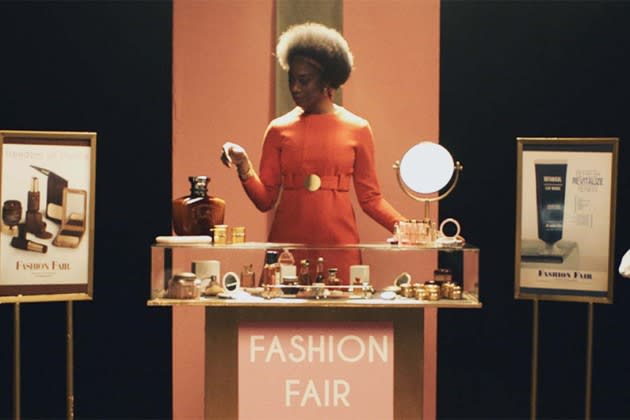‘The Beauty of Blackness’ Documentary Chronicles the Colorful History of Fashion Fair Cosmetics

The Beauty of Blackness, a documentary currently streaming exclusively on HBO Max, chronicles the rise — and revival — of one of the American beauty industry’s most historic brands: Fashion Fair Cosmetics.
First launched in 1973 by Eunice Johnson, publishing executive and wife of Johnson Publishing Company CEO John H. Johnson, Fashion Fair Cosmetics was the first national makeup line formulated and designed specifically for Black women, an inclusive mission that is more recognizable in today’s market, but whose broad and rich shade range was impossible to find at the time.
More from The Hollywood Reporter
Cheryl Mayberry McKissack and Desiree Rogers, both former executives at the Chicago-based Johnson Publishing (which owned Ebony and Jet magazines, along with Fashion Fair), bought the company out of bankruptcy in November 2019 for $1.85 million, and now, as co-owners (and president and CEO, respectively) have ushered it into its next chapter.

Courtesy of Heather Houston
The collection, which is now vegan and cruelty-free, includes foundation, powder, priming serum, and 11 former bestselling lipstick shades with the addition of new nudes. It is available exclusively at Sephora and the brand’s revamped site.
“I think it has an opportunity to appeal to both women who are loyalists and women who are new, who perhaps haven’t experienced the brand yet,” Mayberry McKissack tells The Hollywood Reporter.
Like many trailblazing initiatives, particularly in the beauty industry, Fashion Fair was born out of necessity. When Johnson could not find products that accurately matched the complexions of Black models participating in Ebony Fashion Fair (the annual, traveling fashion event she created that doubled as a charity fundraiser), the cosmetics line was born. It offered a bold range of tangerine and plum-hued lipsticks and eyeshadows for women of color (who were generally marketed more neutral earth-tones) and ultimately became the first international cosmetics brand for women of color available in high-end department stores like Neiman Marcus.
“She started this company to really provide a solution for a problem. The general market companies who were selling cosmetics were not making shades for women of color,” says Mayberry McKissack.
The documentary — directed by Tiffany Johnson (Black Monday, Dear White People and Twenties) and Kiana Moore (vp of content production and head of Vox Media’s Epic Digital) — tells this story through a chorus of voices, including former Fashion Fair models like Pat Cleveland, singer Kelly Rowland, designer Sergio Hudson, and celebrity makeup artist Sam Fine.

Courtesy of Fashion Fair
“Fashion Fair Cosmetics provided some of the most important cultural moments for people of color,” says Fine, who over his 30-year career has worked with several notable actresses (Queen Latifah, Halle Berry, Beyoncé Knowles, Kerry Washington, Jennifer Hudson) and supermodels (Tyra Banks, Veronica Webb, Iman, Naomi Campbell). “With little to no representation in cosmetics, Eunice Johnson single handedly made history and created a safe haven for women of color in cosmetics — for both consumers and employees alike. I was thrilled to participate in the documentary and speak on the historic rise, fall and relaunch of this iconic brand. Having become the first Creative Makeup Director and launching the first co-branded collection for the brand has been a highpoint in my career; a homecoming of sorts.”
Filmed over the course of 2020, the film was produced by Sephora in partnership with Vox Media’s Epic Digital and Vox Creative, and streaming rights were ultimately acquired by HBO Max.
“One of the things you see in it is that it tells the history and creates that bridge to be able to tell the story of what has been, but is also equally important to tell the story of what is and what can be. And so you’ve got like three different divisions: what happened, what is happening, and then you have people projecting what this means for the future,” says Mayberry McKissack.
Adds Rogers: “No one is going to — just because of nostalgia — buy something. So how do you excite people today about a brand that has the history but is in a crowded market? We worked with a Black dermatologist [Dr. Caroline Robinson] who knows skin, and we also worked with Sam Fine who really [knows color], in terms of being able to tweak those undertones, making certain that we have a neutral and a cool undertone.”
Today, following several cross-generation focus group meetings, Rogers and McKissack have a strong sense of what the modern consumer is looking for: perfect color matches, natural ingredients, products that perform double duty — like moisturizing lipsticks with great color payoff.
“It really is the first cosmetics company that was developed in honor of Black woman’s glamour, beauty and fashion,” says Rogers. “Black women sit at the cornerstone of this amazing brand and we don’t have many of those that have been around 50 plus years.”
